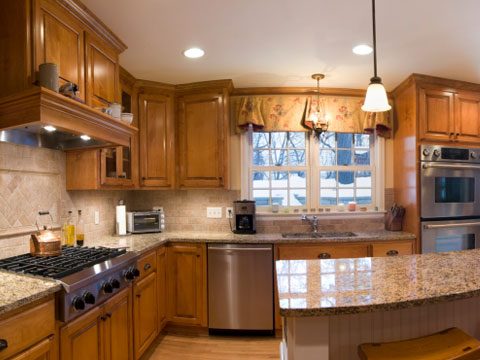Your kitchen will become your favorite part of the house with these tips and tricks.
See the light.
Unlike in other rooms of the house, overhead lighting is insufficient in kitchens, says electrician Richard Terode. “In the kitchen, you don’t want the light behind you, casting a shadow on the workspace. You need it positioned to fall in front of you.” He likes under-cabinet lights because they shine directly on countertops.

Think ahead.
When redesigning a kitchen, put function first, says interior designer Jacqui Hargrove. “There’s no ideal kitchen shape,” she says. “Whether it’s a galley or U- or L-shaped, plan for the sink, fridge and cooktop to form a triangle, with no more than 6 feet between each for ease of movement.

Make room for storage.
“The biggest mistake people make at the planning stage is not allowing for enough storage,” Jacqui says. “Use every nook and cranny. Put overhead cabinets right up to the ceiling, rather than leaving a gap on top that collects dust.” Consider deep drawers for easier access to pots and pans, and include enough storage for appliances that otherwise would clutter up countertops.

Power play.
Be sure there are appropriate power sources for relocated or new appliances. Many people realize too late that they don’t have the right gas or electric lines, Richard says. Plumber Stuart McGroder also suggests measuring appliances to ensure that they fit comfortably into allocated spaces. “If a dishwasher is crammed in, it could push up against the hose and won’t drain properly,” Stuart says.

Space and surface.
There’s no such thing as too much counter space. Choose a surface that’s easy to work on and care for. But keep in mind that grout between tiles is hard to maintain and that stainless steel will scratch very easily.

Space and surface.
There’s no such thing as too much counter space. Choose a surface that’s easy to work on and care for. But keep in mind that grout between tiles is hard to maintain and that stainless steel will scratch very easily.

Start fresh.
Don’t reuse appliances or items from the old kitchen. It may seem as if you’re saving money, but an old appliance will stick out like a sore thumb in a new environment, says Jacqui. Find other ways to economize. “You don’t have to spend $100 on a drawer handle when cheaper ones still look fantastic,” she says. “The same goes for countertops.”
Safety first.
Make your kitchen as safe and family-friendly as possible by planning for good visibility to backyard and indoor play areas from the cooking area, suggests Dorothy Bell, a home safety expert. Also consider such safety-conscious elements as rounded countertops, slip-resistant flooring and ovens located at adult height to minimize the chances of accidental burns.

Clear the air.
A range hood helps ventilate cooking odors, says appliance consultant James Moore. “Buy one that’s efficient, quiet and vented outside,” he advises.
Trash talk.
Don’t forget to plan for garbage and recycling bins. Do you want built-in bins cleverly disguised behind a cabinet door, or a sleek, stainless-steel garbage container that’s positioned out of the way?

Look out below
When it comes to flooring, consider slip-resistance, ease of maintenance and porosity, suggests consultant Craig Verdon. Stone floors, which are somewhat porous, for instance, may need periodic resealing. If so, ask how often, and think about whether you want to deal with that process. “Hardwood floors are beautiful, but be aware that they wear out faster by the fridge, stove and sink than other areas,” he notes. “Hard, natural stone works wonderfully, and the earthy look and feel of it is very popular.”






